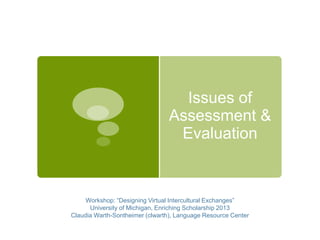Assessing and evaluating virtual intercultural exchanges
•Descargar como PPTX, PDF•
1 recomendación•1,054 vistas
Denunciar
Compartir
Denunciar
Compartir

Recomendados
Recomendados
Más contenido relacionado
Destacado
Destacado (9)
Web 2.0 and Social Media in the Language and Literature Classroom

Web 2.0 and Social Media in the Language and Literature Classroom
Preparation and evaluation of instructional materials

Preparation and evaluation of instructional materials
Similar a Assessing and evaluating virtual intercultural exchanges
Similar a Assessing and evaluating virtual intercultural exchanges (20)
Making that Matters: MURSD Ed Tech Teacher Summit Presentation

Making that Matters: MURSD Ed Tech Teacher Summit Presentation
Web based, eportfolios & e-assessment (Updated version)

Web based, eportfolios & e-assessment (Updated version)
Designing Meaningful Learning with Technologies in CrossActionSpaces

Designing Meaningful Learning with Technologies in CrossActionSpaces
Leveraging digital technologies to advance the potential of peer review pedag...

Leveraging digital technologies to advance the potential of peer review pedag...
Thinking about implementing e-portfolio in education

Thinking about implementing e-portfolio in education
Pedagogical design for honors study abroad and beyond 

Pedagogical design for honors study abroad and beyond
Personal digital inquiry slides 2016 keynote final

Personal digital inquiry slides 2016 keynote final
Outcomes and Assessment for Bonner and Campus Centers

Outcomes and Assessment for Bonner and Campus Centers
Collaborative learning-Workshop presentation to college Development Scotland ...

Collaborative learning-Workshop presentation to college Development Scotland ...
UEA DTS programme - Blended learning workshop (May 2015)

UEA DTS programme - Blended learning workshop (May 2015)
Opportunities extended project qualification and beyond

Opportunities extended project qualification and beyond
Opportunities: Supporting the extended project qualification

Opportunities: Supporting the extended project qualification
Más de Claudia Warth
Más de Claudia Warth (13)
Blended language learning strategies (lecture, Sèvres, July 2011)

Blended language learning strategies (lecture, Sèvres, July 2011)
Social media, Web 2.0 & language teaching (Foresite, Sèvres, July 2011)

Social media, Web 2.0 & language teaching (Foresite, Sèvres, July 2011)
icEurope ELF (Vienna) Engl for intercultural purposes_warth

icEurope ELF (Vienna) Engl for intercultural purposes_warth
Computer-mediated intercultural discourse - methodological approaches

Computer-mediated intercultural discourse - methodological approaches
CMC SIG Leon 2009 Claudia Warth E Learning Scenarios

CMC SIG Leon 2009 Claudia Warth E Learning Scenarios
Assessing and evaluating virtual intercultural exchanges
- 1. Assessing and Evaluating Virtual Intercultural Exchanges Claudia Warth-Sontheimer University of Michigan
- 2. Planning for Evaluation & Assessment in your Virtual Exchange Project What are the learning objectives and outcomes of your project? How do you assess online intercultural exchanges? Do you require proof of participation? (e.g. print-outs of their interaction) and/or products of interaction (blogs, websites, essays)? What do you assess / evaluate of your students' online activity when they take part in online exchanges? Do you assess the level of participation (e.g. no. of posts written)? Do you assess the students’ ability to interact? If so, how do you do this? Are grades given for aspects of their electronic literacy? Are the skills, attitudes and knowledge of intercultural communicative competence taken into account? If so, how do you achieve this? Do you look for students’ reflection on learning (e.g. portfolios, diaries)? Which tools and measures are you going to use? Is there an external need for evaluation? (adapted from O’Dowd 2010)
- 3. Evaluation that takes into account virtual – communicative & intercultural dimensions (O’Dowd 2010)
- 4. Using an (reflective) online exchange portfolio to document and demonstrate knowledge and skill development (O’Dowd 2010)
- 5. Assessment & Evaluation in icEurope Tools used: • pre-, while- and post-assessment, based on Byram + INCA (plus: “language and culture learning biography & passport”) • reflective journal • case study of individual students • focus groups: interviews with individual students and small groups • teacher interviews • rubrics for activities / products / outcomes • rubrics & guidelines for posting in forums • teachers used different tools for evaluation with their classes (quizzes, essays, grading forum posts or activities…) (some chose not to grade)
- 6. Resources Deardorff, D. K. (ed.) (2009). The SAGE handbook of intercultural competence. Thousand Oaks: SAGE Publications. Fantini, A. E. (2009). Assessing intercultural competence. In: Deardorff, D. K. (ed.) (2009). The SAGE handbook of intercultural competence. Thousand Oaks: SAGE Publications. 456-476. INCA (2004). The Theory. www.incaproject.org/en_downloads/24_INCA_THE_THEORY_eng_final.pdf O’Dowd, R. (2010). “Issues in the assessment of online interaction and exchange" in Guth & Helm 'Telecollaboration 2.0: Language, literacies and intercultural learning in the 21st century'. Peter Lang Publishers. www3.unileon.es/personal/wwdfmrod/Assessment2.doc Sinicrope, C., Norris, J. M., & Watanabe, Y. (2007). Understanding and assessing intercultural competence: A summary of theory, research, and practice. Second Language Studies, 26(1). www.hawaii.edu/sls/uhwpesl/26(1)/Norris.pdf
